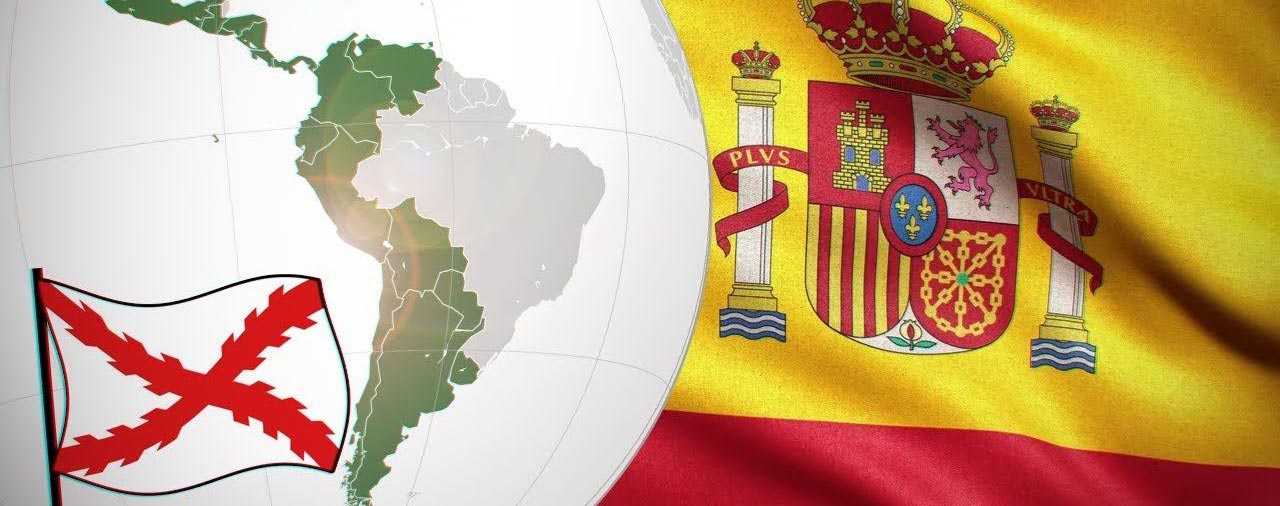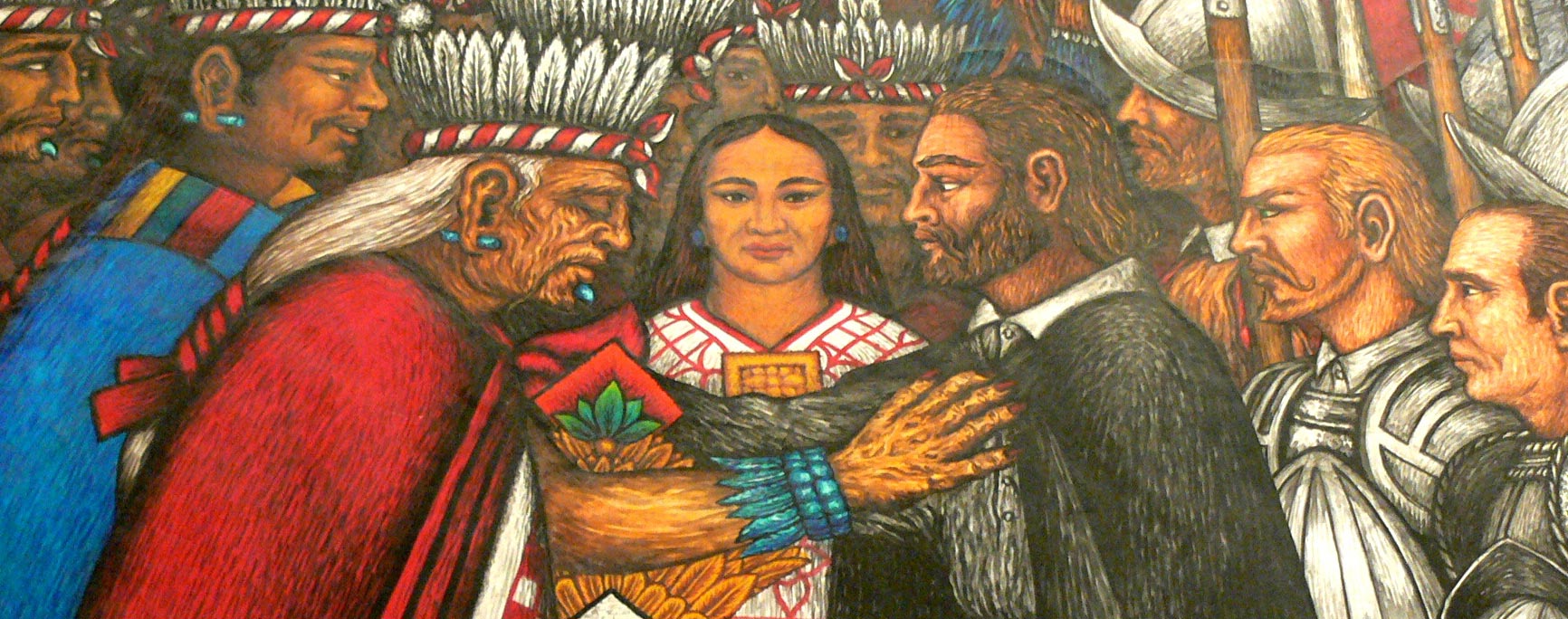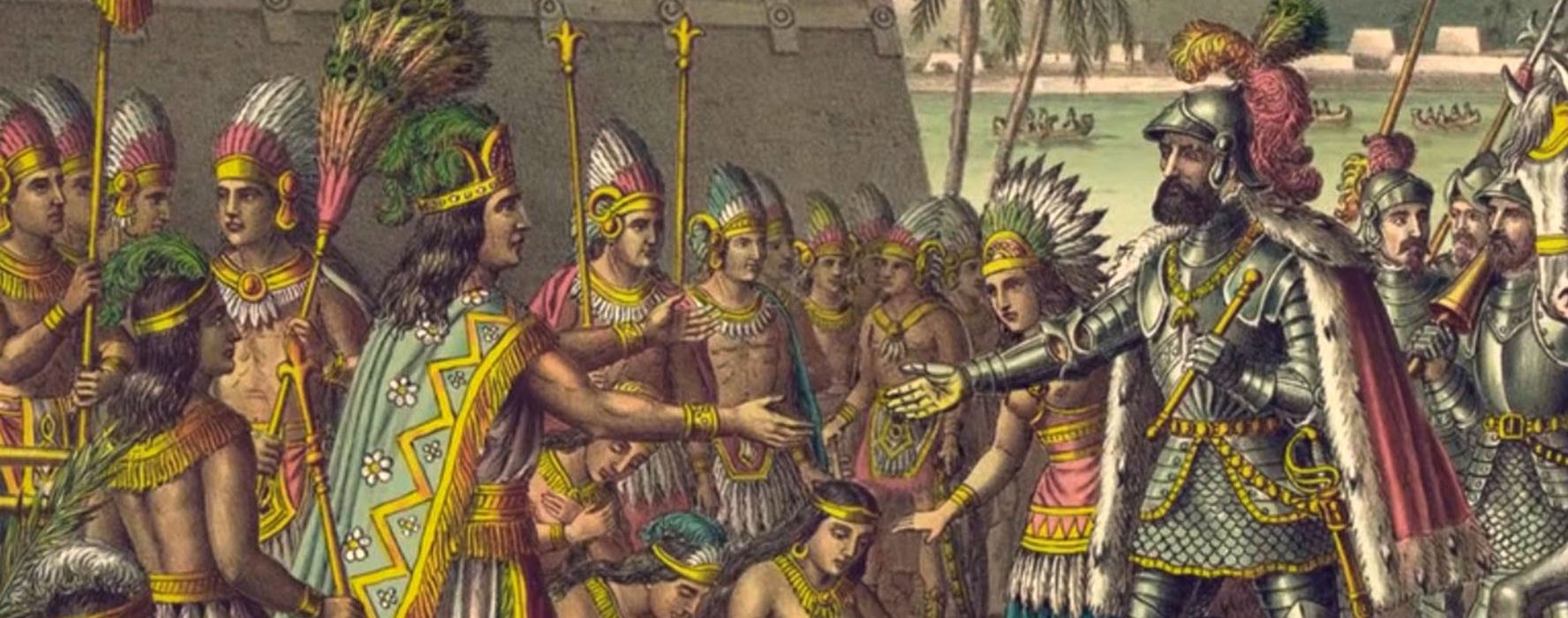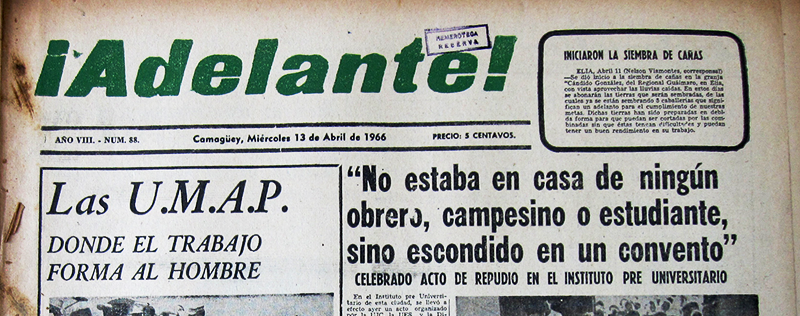Source:hdavila.com
At this point in the 21st century, the neologism Latin America has spread throughout the world despite being fallacious and carrying behind it the historical memory of how the Anglo-Saxon Protestant and French world used all its resources to destroy the Spanish empire and with it, the Hispanic world. We will see later that Latin America will be an effective tool in the hands of the incipient Protestant powers against the Hispanic world to the extent of bringing us to the present situation.
When was the neologism Latin America born and who created it?
In 1836, the French socialist politician Michel Chevalier created the neologism Latin America after having travelled to the United States and Mexico on a mission for his government in which the French proposed copying the economic and political model of the thirteen British colonies that had already been emancipated for 60 years.
Chevalier believed he saw in Mexico and the US the imprint of two supposed civilisations, one Saxon and Protestant, the other Latin and Catholic. As Rubén Torres rightly points out, Chevalier perceived:
One was Saxon and Protestant, industrious, white, attached to and respectful of the institutions it was creating itself, but discriminatory and rejecting of everything different from itself, contemptuous of other cultures and with a clear manifest destiny; the other America was Latin, Catholic, of mixed race, European but barbaric at the same time (Sarmiento’s Facundo), without recognition or respect for the flimsy institutions that were being shaped, but without fear of the other, it likes to know it, confront it, teach it and learn from it. It is a very romantic idea of Latinity versus a very pragmatic idea of the Saxon.
Chevalier’s assertions were recorded in a document entitled Lettres sur l’Amérique du Nord published in 1836, which also reveals an incipient but strong idea of racism, which would take a more scientific and academic form in England thanks to the misrepresentation of Charles Darwin’s On the Origin of Species, published in London in 1859.
It should be borne in mind that by the time the neologism Latin America appeared, the emancipation of the Spanish provinces had been taking place since 10 August 1809, when what is now Ecuador declared itself independent from Spain. Latin America appeared in the world when the first years of the republican life of the former Spanish Provinces were without a clear direction and because of this it was not strange that its elites were so disoriented that they embraced England or France as their role models; that is why heroes such as José de San Martín, Bernardo O’Higgins or Simón Bolívar adopted the English fashion or learned English or French as a second language, as well as maintaining strong ties of submission with these two nations or with the USA, which was already beginning to expand its influence in the world. The US was already beginning to expand in America thanks to a radicalisation of the Anglo-Saxon racism it inherited from England.
After the emancipation of the thirteen English colonies in North America, the West (Europe) began to experience a major upheaval. The Spanish empire was already showing signs of faltering and would gradually collapse, after the occurrence of one of the greatest slaughters the world had ever seen, called the French Revolution (1789) and then with the appearance of the genocidal French imperialist Napoleon Bonaparte in 1804, who proclaimed himself Emperor of a supposed empire that was never such, leading France to militarily invade Spain, Egypt, Prussia, Austria and many others. He also committed atrocities in Haiti and Guadeloupe where he ordered the murder of more than 100,000 people, the imprisonment of political dissidents and the banning of intermarriage.
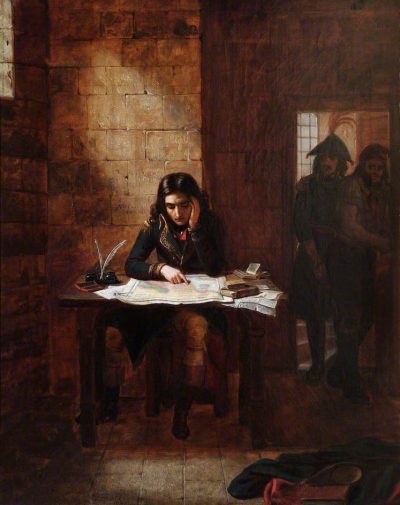
After committing so many madness and massacres, Napoleon Bonaparte died in St. Helena prison on 5 May 1821, where he had been imprisoned even by his own citizens. Painting from the Wellington Collection, by Edward Matthew Ward (1816-1879).
After Chevalier created Latin America, another Frenchman appeared on the scene, this time in 1850, the mercantilist Benjamin Poucel published pamphlets calling on France to intervene in America because the advance of Anglo-Saxon imperialism in the United States meant that France was gradually ceasing to be the world power. Napoleon III, a less worthy nephew of Bonaparte, was neither slow nor lazy to entertain the fantasy of subjugating Hispanic America, starting with Mexico. These actions took place between 1862 and 1867 and it was the second great interference of France after its first (1808) intervention in Hispanic America together with England to destroy the Spanish empire resulting in the emancipation of the current Hispanic countries, including the Philippines.
Why is the neologism Latin America a mistake?
Well, it is necessary to point out that the countries of America that emancipated themselves from the Spanish Empire are not Latin, but Hispanic. To understand this a little more fully, it is necessary to refer to the concepts developed by Gustavo Bueno about empires, clearly differentiating between predatory empires and generative empires. A predatory empire is basically one that uses technology, knowledge, science, language and philosophy to exterminate the inhabitants of the occupied lands while extracting the greatest amount of material benefits during the time of its occupation. This is the clear method of England, the USA, Holland, Germany, and France. These empires, being predators, never mix their blood with that of the natives they subjugate through various forms such as taxation, the banking system, misappropriation of property, and in the extreme, concentration camps and mass murder, as exemplified by the episodes carried out in the USA against the Indians or in Germany against the Jews and other minorities.
Diametrically opposed to the predatory model are the generating empires, which, although it is true that they obtain wealth from the new territories they reach, have the capacity to share technology, science, knowledge, language, culture and philosophy with the native inhabitants. Thus, for example, the inhabitants of Spanish America are Hispanic because genetically they are descendants of a mixture of indigenous and Spanish, although it is clear that in 500 years some genes from other peoples have been added, as is the case in some South American countries such as Chile, Uruguay, Argentina and Brazil, although these are of a lower percentage, as the mixture of indigenous and Spanish predominates.
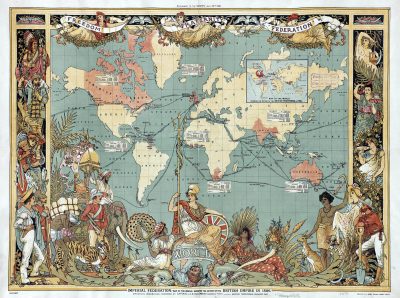
Map from the 19th century showing the robbery and murder missions committed by England in various parts of the world.
In the case of the countries of Hispanic America, it is clear that their roots are Spanish and indigenous, so it is logical that the word Hispanic American is understood as Spanish of America because that is indeed what it is. We Hispanic Americans are Spaniards of America with a small difference from the peninsular Spaniards.
To say that Latin America exists and that we are therefore Latin Americans is not only a historical error, but also a falsehood, since we are neither culturally nor idiomatically Latin. Latin was the Latin-speaking inhabitant of Latium, which reached its peak during the Roman Empire. However, there are those who argue that we are Latin because Rome conquered Hispania (218 B.C.) and that therefore, as descendants of the Spanish, we must be Latin. This argument alone lacks rigour, for if it were true, then we would have to accept that all of humanity is African because, as is well known, Homo sapiens came from a common ancestor who appeared in Africa 315,000 years ago. As you can see, this argument cannot even be taken seriously.
In Hispanic America we are Hispanic because we are descended from Spaniards and indigenous people, and we communicate with the language of Cervantes. Racist ideology has no place in the Hispanic world, but only in the Anglo-Saxon Protestant world. Only in a few episodes in history has racism made its appearance in Hispanic America and it has been thanks to the migration of racist ideas from France, England or Germany at the end of the 19th century and the beginning of the 20th century in countries such as Argentina, Uruguay or Chile, where at least in the first two, their elites boast of not having indigenous blood and proclaim themselves to be descendants of Europeans; expressing the unspoken idea that the European is superior and better than the indigenous and the Hispanic.
It should also be remembered that Spain’s work in America, despite the Black Legend, was to civilise the local populations, with whom it shared its technology, language, science, philosophy, religion and culture. It would also be a mistake to say that the inhabitants of Spanish America are 100% indigenous, since there has always been a mixture of blood, sometimes more, sometimes less, but there has always been and still is.
The need to return to Hispanism
One of the most important facts about Hispanism is its doctrine, which is still not very clear to many. For example, this doctrine confirms that Hispanism is not a friend of commerce, but neither is it its enemy. This means that Hispanism has never had the problem that Anglo-Saxon Protestantism has, which in the name of materialism in an excessive defence of commerce, has led to the valuation of human life, because for Luther and Calvin, God judges Man by his material works produced by labour. The evolution of Lutheran theology resulted in German idealism, which led to the two world wars and tremendous carnage, and ultimately resulted in the modern view of trade, where the Anglo-Saxon powers sought to make the most of human labour, not only physical but also intellectual. Let us take for example the case of the technological assembly maquilas or the service centres where the predatory powers take advantage of the human resources developed by the countries on the periphery, obtain the greatest amount of benefits from the host country, pay salaries in a foreign currency that their own governments print and at the end of the business there is zero technological transfer to the country that hosts the maquila.
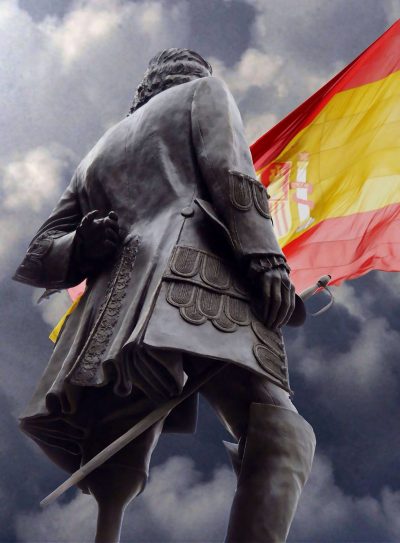
Blas de Lezo y Olavarrieta the Spanish admiral who beat and defeated the English on multiple occasions and thanks to which he was left one-eyed, with a useless arm and without a left leg, but still continued to defeat the English.
Max Weber in The Protestant Ethic and the Spirit of Capitalism develops the theory that Protestant theology differs from Catholic theology in the way it views work, wealth and poverty. With it, it is possible to understand why for little more than a century in the West the most materially rich countries are Protestant and the least rich or poor are Catholic. What Weber never said is that three hundred years of Protestant theology would give rise to racism, Anglo-Saxon idealism, the slave trade and the two world wars that dragged millions of human lives to their deaths.
In this sense, the neologism Latin America should be discarded to give way to the correct term, Hispanic America, and the inhabitants of the region should be referred to as Hispanics, Hispanic Americans, Hispanioamericans, Spaniards of America or, if we wish to include Brazil, we can call it Iberoamerica and Ibero Americans.
Today no one dares to criticise the Commonwealth, the community of nations or peoples exploited by England that continue to bow their heads to the English Queen, but there are dissenting voices who call the Discovery of America by Admiral Columbus a genocide. Why? This is known as the Spanish Black Legend and I have already dealt with it in another article which I invite you to read here. It must be taken into account that nowadays Hispanic America is subjected to many influences that have nothing to do with Hispanic culture and that is why it is stumbling from failure to failure, for not turning its eyes to the Hispanic doctrine. In this way, Latin America continues to be a very effective weapon for predatory empires that use the stratagem of buying off the region’s elites with bribes and this has proved to be the seed that has brought corruption to the entire Hispanic world. Let us ask ourselves for a moment who outside of Hispanic America benefits from corruption in the region. Evidently, the main beneficiaries are those nations outside the Hispanic world that do business with these elites, and as if by coincidence, the most abundant are the companies of the Anglo-Saxon powers.
Hispanism has much to offer not only to Hispanic America, but also to the world. For example, by discarding racism, putting human life before commerce, allowing economic freedom with measure and ensuring social peace, for no matter how much one may criticise Hispanism, it has never been capable of engendering aberrations such as the French Revolution, the two world wars or the Jewish holocaust. Is that not enough? The problem is that Hispanism has been radicalised towards the left, forgetting that the main good that the Hispanic doctrine defends is the human being.
The return to the Hispanic doctrine will not happen until we start calling things by their true name, Hispanic America for Latin America, and Hispanic Americans for Latinos.
Do you want to know more? I recommend you consult the following bibliography
Bueno, Gustavo. España frente a Europa. 2019.
Bueno, Gustavo. Pamphlet against the really existing democracy: (plus an article and seven scratches on democracy). 2020.
Roca Barea, María Elvira. Imperiofobia y leyenda negra: Roma, Rusia, Estados Unidos y el Imperio español. 2016.
Torres Martínez, Rubén. On the concept of Latin America, a French invention? 2016.
Share this article
On This Day
No Events
History of Spain
26 August 2020
27 January 2021
Communism: Now and Then
23 December 2022
28 July 2021
